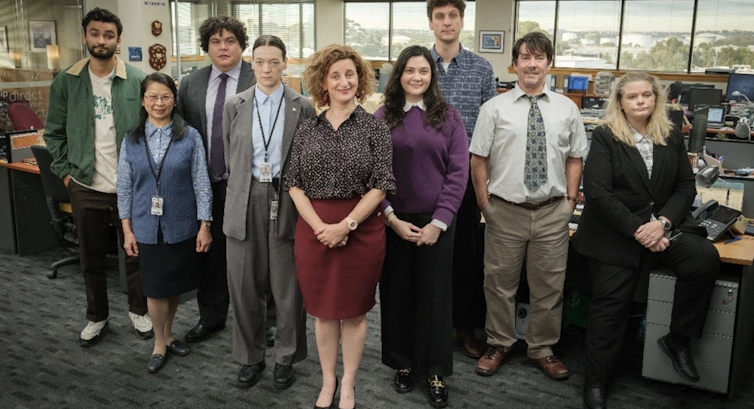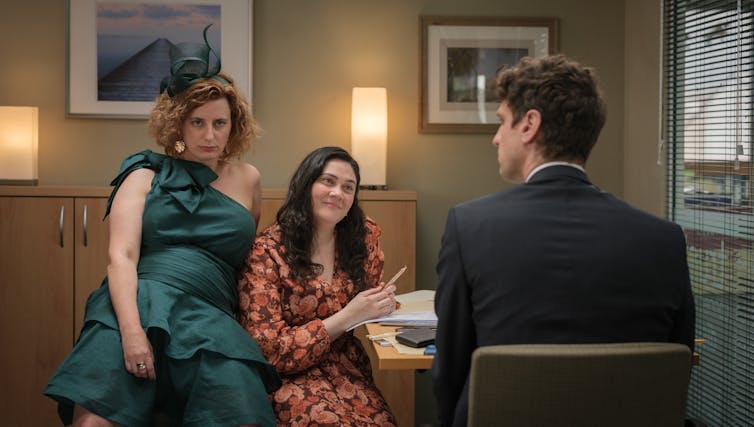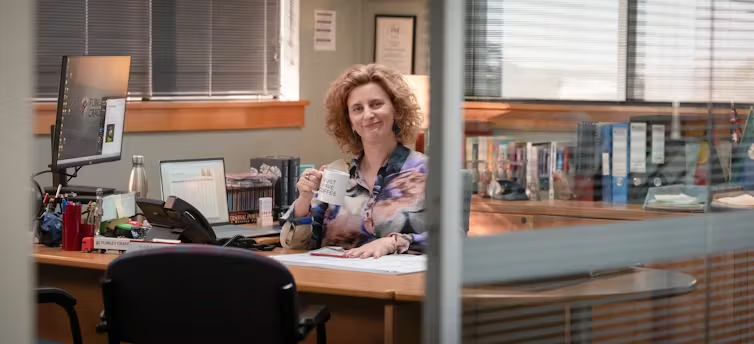By Philippa Burne, The University of Melbourne
Firstly, let’s revisit the question: why are they remaking The Office?
Just over ten years after the United States version of the British series ended, Australia has decided to make its own version. It follows franchises in Canada, Greece, India, Sweden and Poland, to name a few.
But we all have offices to go to, we all have our particular office cultures, co-workers and complaints. Post-pandemic, office life is becoming routine again. The more things change, the less things change, and that could be the theme of The Office Australia.
In fact, this is probably the perfect timing for this remake: post work-from-home, when large corporations are demanding workers return (often unwillingly) to shared workplaces. That’s the premise of the pilot episode of The Office Australia – everyone stops working remotely and reunites at the office. It’s timely and a good way of updating the concept to make it relatable.
Modern nods, same old business
A few more nods to contemporary office culture are included, such as Zoom meetings and standing desks. But apart from that, the Australian Office could be set anytime from the 1990s onwards in terms of the look, practices and low-fi tech of the office itself.
The remake mirrors closely the US version: a romance storyline, tensions between office and warehouse, an old-school boss who loves, craves and needs camaraderie, and a staff for whom work life comes second to what they’d rather be doing.
The original United Kingdom series of The Office, by Ricky Gervais and Stephen Merchant, only had 12 episodes, which is still surprising to realise given how much it defined television sitcom in the decades following. Parks and Recreation (2009–2015) owes a huge debt to The Office. Whether we would have had Utopia (2014–present) without it is debatable. The late, great John Clarke broke in Australia with The Games (1998–2000) and Australia has long done this sort of observational comedy very well.

Despite a deep vein of experience and success to draw on, The Office Australia sticks closely to The Office format in terms of stories, characters, tone, look and laughs.
This might be because the show – made by Amazon and BBC Australia – is launching into around 240 countries and territories. It needs to find a line between being Australian and being international. That said, it has probably veered more into the international end of the scale, with enough Australiana (venomous snakes, barbecues) to ground it here, but still universal enough to be widely relatable and understandable.
The US version had 201 episodes, giving it scope to develop the characters and the storylines and make it a massively popular and frequently rewatched series. (There’s a follow up series in the works called The Paper.) So it’s no wonder writers Julie De Fina and Jackie van Beek looked to the this version for guidance for the Australian series. This is less an adaptation than a remake with a different accent.
Familiar and new faces
Hannah Howard (Felicity Ward) is the devoted office manager who loves her job too much and runs an under-performing, dysfunctional workplace of uninterested staff.
The show centres on her, with the familiar mockumentary style. Like David Brent and Michael Scott before her, Hannah Howard is optimistic, naive, relentless and terrible at staff management. She forces pyjama days and bus trips on her employees, who are clearly unwilling yet never actively rebel. There is plenty of comedy in the awkwardness and small moments.

Her devoted assistant and receptionist Lizzie (Edith Poor), a former Scout, wears a grey suit and will pursue any idea no matter how ill-conceived or illegal to make Hannah’s plans come to fruition.
Long-suffering human resources manager Martin (Josh Thomson) tries to keep them from actually breaking laws, while Nick (Steen Raskopoulos) and Greta (Shari Sebbens) gaze awkwardly across their workstation divider at each other in a slow-burning love story. There are the usual office roles which offer story beats: accounting, IT, sales.
The first Australian season of The Office might not be anything new, but I kept watching. It felt safe, even comforting. Perhaps in a similar way going to someone else’s family for Christmas lunch can feel familiar: recognisable foods, decorations, known characters – but with the frisson that maybe something different will happen this time.
This remake knows what it is. It’s been made to satisfy an audience wanting to be in a world that reflects their own experiences, but takes it just that bit too far. It’s not setting out to break moulds, but to bring the mould up to date and give it an Australian voice for the world to hear.
The Office premieres on October 18 on Prime.
Philippa Burne, Honorary Fellow (Screenwriting), Victorian College of the Arts, University of Melbourne/PhD Candidate, UniSA Creative, The University of Melbourne
This article is republished from The Conversation under a Creative Commons license. Read the original article.



